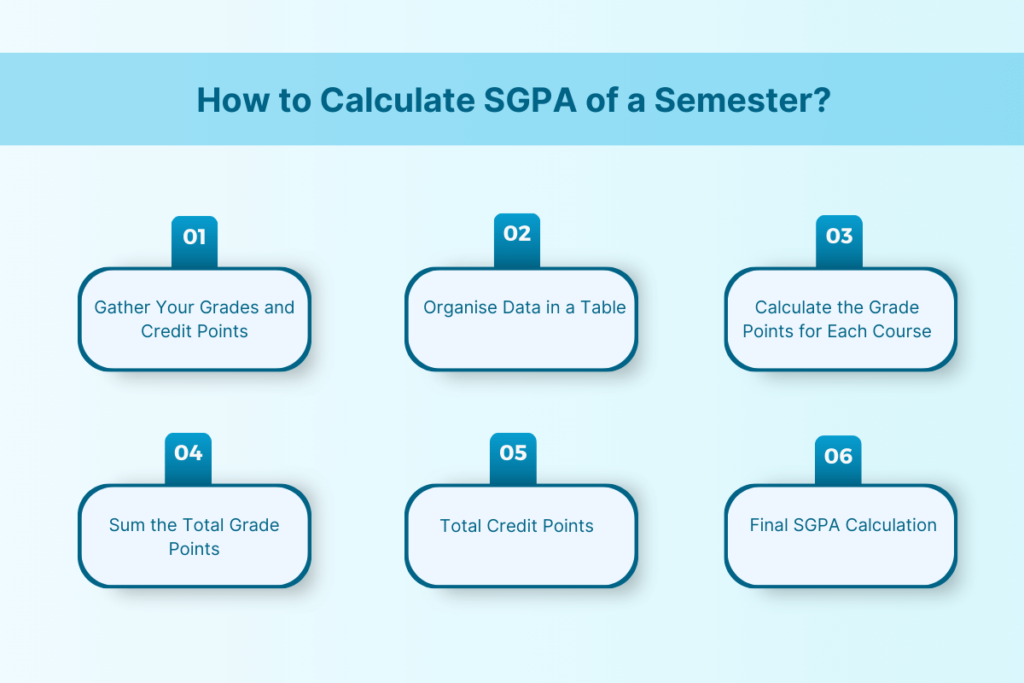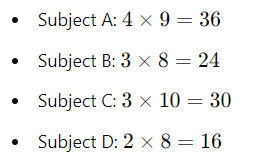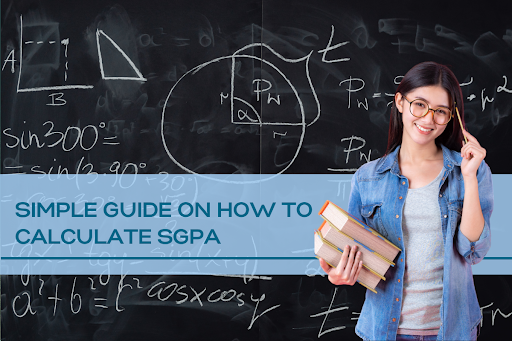Do you know that 67% of study-abroad alumni secure jobs within six months of graduation? For students like you aiming to study overseas, academic performance plays a key role in creating such opportunities. That’s why understanding how to calculate SGPA is crucial—not just for admissions but also for scholarship applications.
Your Semester Grade Point Average (SGPA) provides a clear picture of your academic performance for a given semester. Whether you’re applying to universities in the US or the UK, an accurate SGPA is often a requirement.
This guide will explain how to calculate SGPA and help you understand the formulas. Dive in!
Key Highlights
| Category | Details |
|---|---|
| SGPA Formula | Total Grade Points / Total Credit Points |
| Differences: SGPA vs. CGPA | SGPA: Reflects single semester performance. CGPA: Overall performance across semesters. |
| Steps of How to Calculate SGPA | Gather grades and credits Organise data in a table Calculate grade points Sum and divide |
| How to Calculate SGPA to Percentage? | Percentage = (SGPA / Max Grade Point) * 100 |
Choose your dream country
When do you want to study abroad?
What's your highest level of education?
Select you current city
How Leap will help you
Personalised University Shortlist
Express Applications with Quicker Admits
End-to-End Application Support
What is SGPA?
SGPA stands for Semester Grade Point Average, a system used to evaluate your performance in each semester of your academic journey.
Depending on the grading system, universities assign grade points to each course, typically on a scale ranging from 0 to 10 or 0 to 4. Your SGPA is calculated by weighting these grade points according to the credit hours assigned to each course. This ensures that courses with more credit hours, which usually require more effort, contribute more to your overall SGPA.
Why Do We Need to Calculate SGPA?
Calculating SGPA is crucial for students planning to study abroad, as it serves as a primary tool for evaluating academic performance. Whether you're applying for top universities or aiming for scholarships, understanding your SGPA and calculating SGPA using an SGPA calculator can significantly impact your academic future.
Here’s why it’s essential to know how to calculate SGPA of a semester.
1. Academic Evaluation
SGPA helps universities assess your semester-wise performance. Many universities, such as Harvard University and the University of Toronto, require consistent academic performance across all semesters. A high SGPA across multiple semesters enhances your chances of getting admitted to these top-tier institutions.
2. Eligibility for Studying Abroad
SGPA is crucial in international university admissions. Universities like Stanford and Cambridge evaluate your academic transcripts, focusing on your SGPA for eligibility.
3. Scholarship Applications
Many prestigious scholarships like the Rhodes Scholarship (Oxford University) and DAAD Scholarships (Germany are awarded based on academic merit, and your SGPA often plays a significant role in determining eligibility.
4. Internship and Job Opportunities
Companies like Google and Microsoft consider SGPA when selecting interns and employees, as it reflects your ability to balance academics and professional commitments.
5. CGPA Calculation
SGPA contributes directly to your overall CGPA and is used by universities like UCL and UC Berkeley for graduate program evaluations.
6. Personal Academic Planning
Regularly tracking SGPA allows you to set academic goals and improve your performance, boosting your prospects for studying abroad and landing internships.
How to Calculate SGPA of a Semester?
Calculating the SGPA for a semester is essential for students who want to monitor their academic progress. This metric helps you understand your performance and influences your academic trajectory, especially if you are planning to study abroad.
Here’s a structured approach to calculating your SGPA for a semester.

- Gather Your Grades and Credit Points
Begin by collecting all the grades you received and their corresponding credit points for each course in that semester. This information is typically available on your university’s student portal or academic transcript.
- Organise Data in a Table
Create a table to organise the data, making it easier to visualise and calculate.
Here’s a sample format.
| Course | Credit Points | Grade Points (0-10) |
|---|---|---|
| Course A | 4 | 9 |
| Course B | 3 | 8 |
| Course C | 3 | 6 |
| Course D | 2 | 10 |
- Calculate the Grade Points for Each Course
For each course, multiply the credit points by the grade points you received. For instance, if you earned a 9 in a 4 credit-point course, the calculation would be

- Sum the Total Grade Points
Once you have calculated the grade points for each course, sum them up. For example

- Total Credit Points
Add the credit points for all the courses taken during the semester.

- Final SGPA Calculation
To find the SGPA, divide the total grade points by the total credit points.

This process provides a straightforward method for calculating SGPA, allowing students to effectively assess their academic performance at the end of each semester.
However, if you want to know how to calculate total SGPA of all semesters, follow these steps.
Step 1: Gather SGPA Data: Collect the SGPA for each semester you want to include in your calculation.
Step 2: Add SGPA Values: Sum up the SGPA from all semesters.
Step 3: Count Semesters: Count the total number of semesters included in your calculation.
Step 4: Divide: Use the formula:
Total SGPA = (Sum of all SGPA) / (Total number of semesters).
How to Calculate CGPA from SGPA?
Now that you know how to calculate SGPA, it’s essential to understand how to convert your SGPA to CGPA. This conversion can help you get a clearer picture of your academic performance over multiple semesters. However, it is essential first to understand the difference between the two.
Here’s a clear comparison.
| Aspect | SGPA | CGPA |
|---|---|---|
| Definition | The average for one semester | The average across all semesters |
| Calculation | Based on grades for a semester | Average of all SGPA values |
| Purpose | Measures semester performance | Reflects overall academic performance |
| Usage | Important for course passing | Used for graduation and applications |
| Scale | Typically 0-10 | Typically, 0-10 or a percentage |
To calculate your CGPA, you need to find the average of your SGPAs across all semesters in a given academic year. Here's the formula:
CGPA = (Sum of all semester SGPAs in an academic year) ÷ Number of semesters
Here is an example.
Let’s say your SGPA in the 1st semester is 8, and in the 2nd semester is 7. To calculate your CGPA for the first year, use the formula
CGPA = (First Semester SGPA + Second Semester SGPA) ÷ Number of semesters
CGPA = (8 + 7) ÷ 2 = 7.5
So, your CGPA for the first year would be 7.5.
How to Calculate SGPA from Marks?
If you're wondering how to calculate your SGPA from your marks, don’t worry—it’s easier than it sounds! All you have to do is take the grades you’ve earned in each subject and the credit points for those subjects, then do a quick calculation. It’s a simple way to see how well you’re doing overall.
Here’s a step-by-step guide on how to do this effectively.
Step 1: Gather Your Marks and Credit Points
Start by collecting your marks for each subject along with the respective credit points. This information can typically be found in your semester results or academic records. For example, assume the following grades and credit points.
| Subject | Marks Obtained | Credit Points |
|---|---|---|
| Subject A | 85 | 4 |
| Subject B | 78 | 3 |
| Subject C | 92 | 3 |
| Subject D | 70 | 2 |
Step 2: Convert Marks to Grade Points
The next step is to convert your marks into grade points based on your institution's grading scale. Many universities use a scale of 0 to 10.
Below is a standard conversion scale.
| Marks Range | Grade Points |
|---|---|
| 90-100 | 10 |
| 80-89 | 9 |
| 70-79 | 8 |
| 60-69 | 7 |
| 50-59 | 6 |
| 40-49 | 5 |
| 0-39 | 0 |
Using this scale, you can convert the marks from the previous table to grade points.
| Subject/ Marks Obtained | Credit Points | Grade Points |
|---|---|---|
| Subject A: 85 | 4 | 9 |
| Subject B: 78 | 3 | 8 |
| Subject C: 92 | 3 | 10 |
| Subject D: 70 | 2 | 8 |
Step 3: Multiply Credit Points by Grade Points
For each subject, multiply the credit points by the corresponding grade points.

Step 4: Sum All the Results
Add all the results from the previous step to get the Total Grade Points.

Step 5: Calculate Total Credit Points
Next, add up all the credit points from each subject.

Step 6: Calculate SGPA
Finally, divide the total grade points by the total credit points to find the SGPA.

How to calculate SGPA to Percentage?
Calculating your SGPA as a percentage is crucial if you want to understand your academic performance in a more familiar format. Converting your SGPA to a percentage gives you a clearer picture of your overall achievement, especially when applying to universities or scholarships requiring percentage scores.
Here's a detailed guide on how to do this.
Conversion Formula
The formula for converting SGPA to percentage generally follows this pattern.

For most cases, the minimum grade point is 0, and the maximum is 10. Thus, the formula is simplified to
This means if you have an SGPA of 8.5, your percentage would be

Example Calculation
Let’s say you have an SGPA of 7.2. To convert this into a percentage:

Common Errors to Avoid While Calculating SGPA
Calculating SGPA can be straightforward, but it's easy to make mistakes. Here are some common errors that you should avoid to ensure accurate calculations.
- Incorrect Credit Point Assignment
Always verify that credit points assigned to each subject are accurate. Using the wrong credit value can significantly skew the final SGPA. For example, if a course is worth 4 credit points but is mistakenly entered as 3, it can lead to an incorrect average.
- Miscalculating Grade Points
Ensure that grade points align with your institution's grading scale. For instance, if your university uses a scale of 0-10, input grades accordingly. Double-check that the grades reflect your actual performance in each course.
- Neglecting to Sum Correctly
When adding the total scores from each subject, it's vital to perform the arithmetic accurately. A simple miscalculation can lead to a misleading total score, affecting the SGPA.
- Forgetting to Consider All Subjects
Sometimes, students may overlook including all subjects in their calculations, especially if they have taken additional electives or labs. Ensure that all courses for the semester are accounted for in the SGPA calculation.
- Not Using the Correct Formula
The formula for SGPA is:

Misunderstanding or misapplying this formula can lead to incorrect results. It’s essential to divide the total score by the sum of all credit points accurately.
- Not Reviewing Calculations
After completing the calculation, always review your work. Cross-checking against your grades and credit points can help identify any discrepancies before finalising your SGPA.
- Ignoring Institutional Guidelines
Different institutions may have specific guidelines for calculating SGPA. Always refer to your university’s grading policy to ensure compliance with their requirements.
- Using Outdated or Incorrect Information
Always use your university's most current grading scale and credit point system. Policies can change, so verify the information from your institution’s official resources.
Understanding how to calculate SGPA is essential for tracking your academic performance, primarily if you aim to study abroad.
So whether you're planning your next academic move or preparing your application, Leap Scholar is here to guide you every step of the way - from choosing the right university to visa assistance, SOP review, and so much more. Connect with us now!
Frequently Asked Questions
-
Q. What is SGPA, and how to calculate SGPA?
Ans. SGPA stands for Semester Grade Point Average, representing the average of grade points earned in a semester. To calculate SGPA, use the formula SGPA = (Total Grade Points) / (Total Credit Points). First, gather your grades and their corresponding credit points for each subject. Multiply the grade points by the credits for each subject, sum these values, and then divide by the total credit points for that semester. This will give you your SGPA.
-
Q. How to find SGPA?
Ans. To find SGPA, collect the grades for all subjects in the semester along with their credit points. Convert your grades into grade points based on your institution's grading system. Apply the formula: SGPA = (Total Grade Points) / (Total Credit Points). This process allows you to assess your academic performance for that semester accurately.
-
Q. Is there an SGPA calculator available?
Ans. Yes, various online tools can help you calculate SGPA easily. SGPA calculator typically requires you to enter your grades and corresponding credit points. They will then compute the SGPA for you, making it a convenient option if you want a quick calculation without manual effort.
-
Q. How to calculate SGPA of a semester?
Ans. To calculate the SGPA of a semester, start by listing all the subjects you've taken, along with their grades and credit points. Convert the grades to grade points using your institution’s scale. Then, apply the formula: SGPA = (Total Grade Points) / (Total Credit Points). This will provide you with the average grade point for that semester, allowing you to gauge your academic standing.
-
Q. How to calculate SGPA from marks?
Ans. To calculate SGPA from marks, first, convert your marks into grade points based on your institution's grading scale. Then, multiply each grade point by the corresponding credit points for that subject. Finally, use the formula SGPA = (Total Grade Points) / (Total Credit Points). This method provides a direct correlation between your actual marks and your SGPA.
-
Q. What is the difference between SGPA and CGPA?
Ans. SGPA is focused on the performance within a single semester, providing a snapshot of your academic success during that period. In contrast, CGPA (Cumulative Grade Point Average) reflects the overall average across multiple semesters, giving you a broader view of your academic journey. Understanding both is essential for tracking progress and making improvements
-
Q. How to calculate total SGPA of all semesters?
Ans. To calculate the total SGPA of all semesters, you need to first determine the SGPA for each semester individually. Then, sum all the semester SGPA values and divide by the total number of semesters. This average will give you the cumulative performance over your entire academic career, which is useful for assessing your overall progress.
-
Q. Why is it important to calculate SGPA?
Ans. Calculating SGPA is crucial for assessing your academic performance each semester. It helps you understand how well you’re doing in your courses and allows you to identify areas where you may need improvement. Additionally, a higher SGPA can enhance your eligibility for scholarships, internships, and job opportunities after graduation.
-
Q. Can SGPA impact my overall CGPA?
Ans. Yes, SGPA plays a significant role in determining your overall CGPA (Cumulative Grade Point Average). Since CGPA is calculated by averaging the SGPA across all semesters, each semester's performance directly affects your cumulative score. Maintaining a good SGPA is essential for achieving a strong CGPA by the end of your degree.
-
Q. How can I improve my SGPA?
Ans. To improve your SGPA, focus on effective study techniques such as time management, active learning, and regular revision. Attend classes consistently, participate actively, and seek help from professors or peers when needed. Developing a study plan tailored to your learning style can also help boost your grades and, consequently, your SGPA.
-
Q. What if my SGPA is low?
Ans. If your SGPA is low, don’t be discouraged. Analyse the reasons behind your performance, whether it's difficulty with specific subjects or study habits. Seek academic support services, such as tutoring or study groups, to help you grasp challenging concepts. Setting realistic goals for improvement and staying committed to your studies can lead to better results in future semesters.
















Have Questions? Get Guidance to reach your Dream University
Connect with India's finest counsellors and biggest study abroad community.
Get Guidance